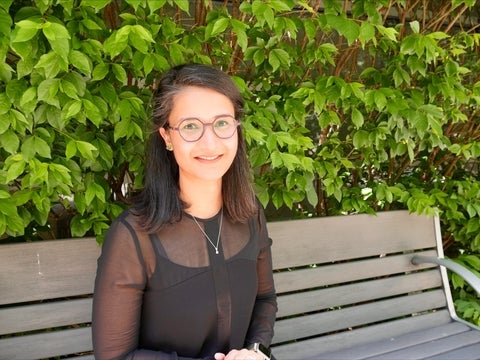
Alina Rashid, Rx2013

Where they’re working
“Lots of students in pharmacy school knew what they wanted to do after they graduated,” says Alina. “I had no idea – but I was fortunate enough to get a residency at Hamilton Health Sciences which allowed me to explore various hospital specialities.”
That residency solidified Alina’s post-grad plans, but not in the way many might expect.
“During my residency, I unfortunately didn’t get to do an oncology rotation due to time constraints,” she says. “That made me want to apply to oncology jobs – to train in this important area. I landed a job with the McMaster Children’s Hospital in their pediatric hematology-oncology unit.”
The role had a steep learning curve for the 2013 grad, but Alina felt both challenged and rewarded by the experience. It inspired her to stay in the oncology field, and in 2018 she transitioned into the world of adult oncology at Princess Margaret Cancer Centre. Three years later she moved to William Osler Health System, where she is the Lead Oncology Pharmacist today.

“On committees, I am the advocate for oncology pharmacists and technicians, providing our perspective and helping shape hospital processes so that they make the best use of the expertise of our pharmacy team,” she says. “I also identify areas where pharmacists can play a key role in improving patient outcomes.”
The Oral Anticancer Therapy (OAT) Program at William Osler is an example of this. Alina led this project, developing a proactive pharmacist-led call-back program that empowered patients on OAT to take charge of their medication management.
“Patients using OAT are not visiting the oncology clinic as regularly,” she says. “With less close monitoring compared to someone on intravenous or subcutaneous therapy, there is increased risk of undetected non-adherence and toxicity. Through our proactive call-back program, we follow up early on in the treatment process and can provide meaningful interventions for the patient.”
The OAT Program that Alina launched includes drug-specific algorithms that give the hospital team a set of standard questions to ask patients. Based on the answers, toxicities are graded and evidence informed recommendations are provided. As part of this project Alina also created multiple patient education materials, and updated all OAT regimens in the CPOE system to add supportive medications such as anti-nausea and anti-diarrhea medications for example.
The program, which was launched in January 2020, has been an incredible success, and won the national HOPE (Honoring Oncology Pharmacy Excellence) award in the category of Interprofessional Programs to Enhance Patient Care. This award is a humbling one for Alina.
“When I started this project, I looked at programs at other hospitals for inspiration,” she reflects. “Two years down the road, I’ve had multiple hospitals reach out to me in the same state. I’m very happy to give them feedback about what we’ve learned and to share our best practices to benefit oncology patients across the country.”
Alumni Answers
UW: What do you enjoy most about working in oncology?
AR: Oncology patients have received a life changing diagnosis and are a very vulnerable population. To work with them as they go through something so transformative – they could be someone my age – is an incredible experience. They often start overwhelmed with lots of information about medications, regimens, their diagnosis and more. I get to help alleviate some of the stress and confusion through chemotherapy education. Patients are so appreciative, and we build a rapport over time. There’s a continuity of care I get in the clinic setting and it means so much to me to be a part of the difficulty journey.
UW: What made you seek out a leadership role in a hospital setting? What advice to you have for others who want to grow as leaders?
AR: Direct patient care in oncology is very rewarding, but through my roles, I’ve realized that I like the work behind the scenes too. It’s empowering to see how my recommendations contribute significantly to patient care, at the process and organization level instead of solely at the individual level.
I’m open to exploring a greater leadership role in the future, but right now I am challenged and engaged. When we graduate, we often are concerned with ‘what’s next’. It’s okay to take time, reflect on the moment, make the most of your current opportunity and make connections across your organization. Never say never – I don’t know where I’m going to be in the next five years, but I know I’ll identify some gaps in my knowledge and move towards filling them. Be open to the possibilities even if you don’t yet feel you have the skill – career growth is about pushing yourself to find the next challenge.
Non-Pharm Fun

“It’s hard to manage – don’t let anyone tell you otherwise – but it’s doable for sure. I also have a very supportive partner who has been there with me throughout my career journey” she says. “For me, having strong female mentors who also have young kids has been very inspiring. My manager at William Osler Health System and my mentor through the Women in Pharmacy Leadership Program are two great examples of that.”